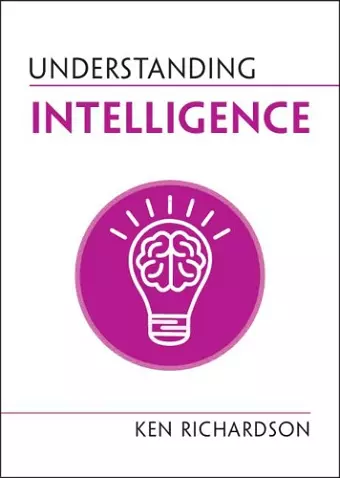Understanding Intelligence
Format:Hardback
Publisher:Cambridge University Press
Published:3rd Feb '22
Currently unavailable, and unfortunately no date known when it will be back
This hardback is available in another edition too:
- Paperback£11.99(9781108940368)

This accessible book explains the origins, evolution, and nature of intelligence, from single cells to human culture and cognition.
This accessible book explains the origins and evolution of intelligence, for everyone curious about the concept, and suspicious of IQ. Enlightened by the most recent research, it encourages readers of all levels to think more clearly about issues in development and education, and the debates and controversies surrounding the subject.Have you ever wondered why psychologists still can't agree on what intelligence is? Or felt dismayed by debates around individual differences? Criticising the pitfalls of IQ testing, this book explains the true nature of intelligent systems, and their evolution from cells to brains to culture and human minds. Understanding Intelligence debunks many of the myths and misunderstandings surrounding intelligence. It takes a new look at the nature of the environment and the development of 'talent' and achievement. This brings fresh and radical implications for promoting intelligence and creativity, and prompts readers to reconsider their own possibilities and aspirations. Providing a broad context to the subject, the author also unmasks the ideological distortions of intelligence in racism and eugenics, and the suppressed expectations across social classes and genders. This book is a must-read for anyone curious about our own intelligence.
'Ken Richardson has written a masterful book about intelligence. In contrast to what leading behavioural geneticists and psychometrically oriented psychologists see as the moderately or highly heritable trait of general intelligence (IQ), Richardson explains why psychometric and behavioural genetic arguments fail, and how intelligence should be seen as a socially acquired characteristic. A longstanding expert on intelligence, he writes in a manner that can be understood by both academic and general readers. I strongly recommend this book as an accessible and important counterweight to mainstream descriptions of intelligence in the fields of psychology and behavioural genetics, and in the media.' Jay Joseph, Psy.D., psychologist and author, Oakland, California, USA
'Ken Richardson's Understanding Intelligence is a timely and important addition to Cambridge University Press's groundbreaking Understanding Life series. Richardson provides a "natural history of intelligence", and no facet of that complex topic goes untouched – adaptive evolution, embryology, endocrinology, circadian rhythms, neural networks, cooperative hunting. In our current moment, where scholars and politicians alike are calling for gene-guided education and appealing to innate differences as the cause of racial disparities, Richardson debunks myth after myth about cognitive ability: that the brain is best conceptualised as a machine, that IQ tests measure intelligence, that different racial groups have naturally different intellectual aptitudes, that the genome is a programme for cognitive development. The esteemed psychologist, in exchange, offers a vision of intelligence as a dynamic, interactive, developing, adaptive system – a system that allows every person to intellectually flourish, if only they are given the opportunity.' James Tabery, Professor of Philosophy, University of Utah, USA
'For decades, Ken Richardson has been a leading voice within the critical approaches to intelligence in psychology. He patiently and determinedly interrogated the often taken for granted assumptions – and myths – about the meaning of intelligence, about how it can be measured and tested, about its heritability or its applicability as a measure of intellectual ability in the school or the workplace. Understanding Intelligence provides a thoroughly researched and persuasively argued up-to-date overview of this important work. It is sure to become an indispensable resource for both academics and practitioners, and indeed for anyone interested in one of psychology's most controversial, and flawed, concepts.' Jovan Byford, Senior Lecturer in Psychology, The Open University, UK
ISBN: 9781108837132
Dimensions: 185mm x 131mm x 16mm
Weight: 340g
150 pages